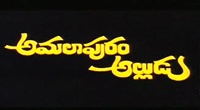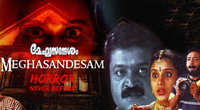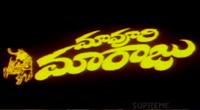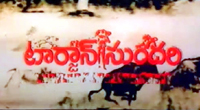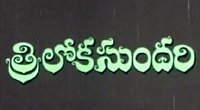The Thin Blue Line is a 1988 American documentary film by Errol Morris, depicting the story of Randall Dale Adams, a man convicted and sentenced to death for a murder he did not commit. Adams' case was reviewed, and he was released from prison approximately a year after the film's release. The Thin Blue Line has been lauded since its release and has won multiple awards.
| The Thin Blue Line | |
|---|---|
Theatrical poster | |
| Directed by | Errol Morris |
| Produced by | Mark Lipson |
| Written by | Errol Morris |
| Starring |
|
| Music by | Philip Glass |
| Cinematography | Robert Chappell Stefan Czapsky |
| Distributed by | Miramax Films Umbrella Entertainment |
Release date |
|
Running time | 103 minutes |
| Country | United States |
| Language | English |
| Box office | US$1,209,846 (US and Canada) |
Screenplay
In October 1976, 28-year-old Randall Adams and his brother left Ohio for California. En route, they arrived in Dallas on Thanksgiving night. The next morning, Adams was offered a job. On the following Saturday, Adams went to start work but no one turned up because it was a weekend. On the way home, his car ran out of fuel.
David Ray Harris (1960-2004), who had just turned sixteen, drove in a car he had stolen from his neighbor in Vidor, Texas before driving to Dallas armed with his father's pistol and a shotgun. Along the way, Harris encountered Adams walking with gasoline canister in hand and offered him a lift. The two spent most of the following day together during which time they consumed alcohol and marijuana. That evening they went to a drive-in movie.
Robert Wood, a Dallas police officer, was working the graveyard shift with his partner, Teresa Turko, one of the first female police officers in Dallas that was ever assigned to patrol duty. Shortly after midnight, Officer Wood stopped the stolen car occupied by Harris, in the 3400 block of North Hampton Road because, as officially recorded, its headlights were not on. As Wood approached the vehicle on the driver's side, he was shot twice by the occupant - whom officer Turko later testified in court as not having seen, as she was (also according to her testimony) standing directly behind the stolen vehicle when the shots were fired. Turko further testified that the vehicle sped off almost immediately after the shooting, giving her little time to react; according to her testimony she managed to fire upon the fleeing vehicle but to no avail.
Officer Wood's autopsy revealed the first shot had hit him in the forearm, after passing through his flashlight. The next shot hit Wood in the chest. The Dallas Police Department investigation eventually led back to Harris, who after returning to Vidor, had boasted to friends that he was responsible for the shooting. When interviewed by police, Harris accused Adams of the murder. Harris led police to the car driven from the scene of the crime, as well as to a .22 Short caliber revolver he identified as the murder weapon.
The film presents a series of interviews about the investigation and reenactments of the shooting, based on the testimony and recollections of Adams, Harris, the judge presiding over the case (Donald J. Metcalfe), and several witnesses (including Emily Miller and R. L. Miller), as well as detectives (including Gus Rose, Jackie Johnson, and Marshall Touchton). Two attorneys (Edith James and Dennis White) who represented Adams at the trial where he was convicted also appear: they suggested that Adams was charged with the crime despite the evidence against Harris because he was a juvenile at the time and that Adams, as an adult, could be sentenced to death under Texas law. The prosecutor (Douglas D. Mulder) does not appear in the film.
The film's title comes from prosecutor Doug Mulder's phrase during his closing argument that the police are the "thin blue line" separating society from "anarchy". This is a re-working of a line from Rudyard Kipling's poem "Tommy" in which he describes British soldiers (nicknamed "Tommy Atkins") as the "thin red line", from the color of their uniforms and their formation.
The film was directed by Errol Morris and scored by Philip Glass. Morris was originally going to film a documentary about prosecution psychiatrist Dr. James Grigson, known as Doctor Death, who testified in more than 100 trials that resulted in death sentences. As an expert psychiatrist, Dr. Grigson made a name for himself by giving testimony in capital cases for the prosecution. Under the law in Texas, the death penalty can only be issued if the jury is convinced that the defendant is not just guilty, but will commit violent crimes in the future if not put to death. In almost every instance, Dr. Grigson would, after examining a defendant, testify that he had found the individual in question to be an incurable sociopath, who he was "one hundred percent certain" would kill again. Grigson told the jury that Adams would be an ongoing menace if kept alive but Morris, after meeting Adams, became skeptical that he committed the crime.
The film contained re-enactment scenes built carefully from witnesses' statements, which became common in later documentaries. Although the film recreates several versions of the shooting, it does not recreate one in which David Harris shoots the officer, the interpretation which it argues is true.
Prior to directing the film, Morris worked as a private detective. Once fascinated by the Adams/Harris case, he applied those skills to his research on the film.
Harris was later tried, convicted, and executed for committing the unrelated murder of Mark Walker Mays on September 1, 1985. On the weekend of that murder, Morris had an interview scheduled with Harris. Morris remarked in an interview with James Hughes: "I often say it's my favorite excuse for missing an appointment: 'I'm sorry, I was off killing someone.'"
Morris' interview style, that of the subject staring directly into the camera, led to a later invention that his wife termed "the Interrotron". It was first used in Fast Cheap and Out of Control (1997), and places Morris behind a curtain staring into a camera, which feeds into a teleprompter-like device that the interviewee can interact with. The interviewee, therefore, looks directly at Morris, and the camera.
The final scene, in which Morris and Harris are only heard, while shots of a tape recorder appear from various angles, was not originally planned. Morris' camera broke down on the day of the interview, forcing Morris to use a tape recorder to document the dialogue.
The Corporation for Public Broadcasting, National Endowment for the Arts, Program Development Company Productions Inc., public television stations, and The Chubb Group of Insurance Companies funded the documentary.
Marketing
Marketing the film was not an easy task, as Morris wished to avoid the label of documentary attached to his film. Miramax, the film's distributor that had originally picked it up for its unconventional look, used marketing hooks to make the film "transition from the arthouse to the multiplex". Harvey Weinstein, former head of Miramax, which distributed the film, declared: "Never has Miramax had a movie where a man's life hangs in the balance". The poster for the film gave it the feel of a whodunit: "A softcore movie, Dr. Death, a chocolate milkshake, a nosy blonde and The Carol Burnett Show. Solving this mystery is going to be murder."
Weinstein even sent a note to Errol Morris pushing him to promote the film better during interviews. The note included, "Heard your NPR interview and you were boring," and recommended the director sell the movie as a highly thrilling and emotional experience similar to watching thrillers or horror movies, and to adopt the usage of shorter and clearer sentences.
Box office
The Thin Blue Line grossed $1,209,846 in the US and Canada. On its opening weekend, in only one theatre, it took in $17,814. Although the film is the 95th highest grossing documentary film released since 1982, Morris says he lost money on the production.
Home media
The Thin Blue Line made its DVD premiere in July 2005 from MGM. In Australia, the film was released on DVD by Umbrella Entertainment in June 2007. The DVD includes Umbrella Entertainment trailers as special features. A special edition Blu-ray of the film was released in North America by the Criterion Collection in March 2015. New features include interviews with Morris and filmmaker Joshua Oppenheimer.
Critical reception
The Thin Blue Line has a metascore of 79 on Metacritic and 100% fresh rating on Rotten Tomatoes. Gene Siskel, writing for the Chicago Tribune, named it the 7th best film of 1988.
Awards
The Thin Blue Line won Best Documentary honors from the New York Film Critics Circle, the Kansas City Film Critics Circle, the National Board of Review, and the National Society of Film Critics. Morris himself won an International Documentary Association Award, an Edgar Award, and a MacArthur Fellowship Genius Grant (1989). Since the film was marketed as "nonfiction" rather than as a documentary, it was disqualified from being considered in the documentary category for an Academy Award.
Legacy
In a 2008 retrospective of documentaries, Variety credits the film as "the most political work of cinema in the last 20 years". The film has had a considerable influence on later television and documentary film, often credited with pioneering the style of modern crime-scene reenactments. In 2001, the film was selected for preservation in the United States National Film Registry by the Library of Congress as being "culturally, historically, or aesthetically significant". Current TV placed the film 2nd on their list of 50 Documentaries to See Before You Die in 2011. In a 2014 Sight and Sound poll, film critics voted The Thin Blue Line the fifth best documentary film of all time. The film was parodied in Season 1 of Documentary Now! as "The Eye Doesn't Lie".
Morris' investigation suggests that five witnesses committed perjury. As a result of publicity around the film, Adams (whose death sentence had been overturned by the U.S. Supreme Court in 1980 and subsequently commuted to life in prison by the Governor of Texas, Bill Clements) had his conviction overturned by the Texas Court of Criminal Appeals; the case was returned to Dallas County for a retrial. The district attorney's office declined to prosecute the case again and Adams was subsequently ordered released as a result of a habeas corpus hearing in 1989.
After Adams' release from prison, he ended up in a legal battle with Morris concerning the rights to his story. The matter was settled out of court after Adams was granted sole use of anything written or made on the subject of his life. Adams himself said of the matter: "Mr. Morris felt he had the exclusive rights to my life story. I did not sue Errol Morris for any money or any percentages of The Thin Blue Line, though the media portrayed it that way."
Morris, for his part, recalled: "When got out, he became very angry at the fact that he had signed a release giving me rights to his life story. And he felt as though I had stolen something from him. Maybe I had, maybe I just don't understand what it's like to be in prison for that long, for a crime you hadn't committed. In a certain sense, the whole crazy deal with the release was fueled by my relationship with his attorney. And it's a long, complicated story, but I guess when people are involved, there's always a mess somewhere."
Despite being wrongly imprisoned for twelve years, Adams received no payment from the state of Texas. Had Adams been found to be wrongly convicted under today's law in Texas, he would get $80,000 for each year of incarceration. However, since Adams was released because his case was dismissed, and not because he was pardoned, he received no payment from the state after his release for his wrongful conviction. Adams later worked as an anti-death penalty activist. He died of brain cancer in October 2010 at the age of 61 but lived in such obscurity that his death was not discovered by the media until June 2011.
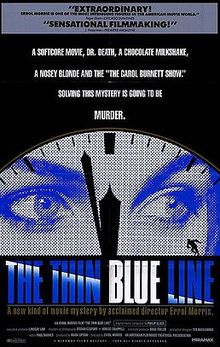 Story of movie The Thin Blue Line 1988 Film :
Story of movie The Thin Blue Line 1988 Film : 







.jpg)


